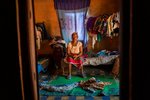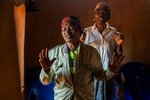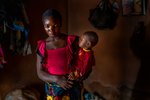


UMUIDA, Nigeria (AP) — As Anayo Mbah went into labor with her sixth child, her husband battled COVID-19 in another hospital across town. Jonas, a young motorcycle taxi driver, had been placed on oxygen after he started coughing up blood.
Jonas would never meet his daughter, Chinaza. Hours after the birth, Mbah’s sister-in-law called to say he was gone. Staff at the hospital in southeastern Nigeria soon asked Mbah and her newborn to leave. No one had come to pay her bill.
Mbah began the rites of widowhood at the home where she lived with her in-laws: Her head was shaved, and she was dressed in white clothing. But just weeks into the mourning period that traditionally lasts six months, her late husband’s relatives stopped providing food, then confronted her directly.
“They told me that it was better for me to find my own way,” Mbah, now 29, said. “They said even if I have to go and remarry, that I should do so. That the earlier I leave the house, the better for me and my children.”
She left on foot for her mother’s home with only a plastic bag of belongings for Chinaza and her other children.
“I decided that I might die if I continue to stay here with my children,” she said.
Across Africa, widowhood has long befallen great numbers of women — particularly in the continent's least developed countries where medical facilities are scarce. Many widows are young, having married men decades older. And in some countries, men frequently have more than one wife, leaving several widows behind when they die.
Now, the coronavirus pandemic has created an even larger population of widows on the continent, with African men far more likely to die of the virus than women, and it has exacerbated the issues they face. Women such as Mbah say the pandemic has taken more than their husbands: In their widowhood, it’s cost them their extended families, their homes and their futures.
Roseline Ujah, 49, spent three decades as part of her husband’s extended family. She shared chores and meals with them, even helping to care for her mother- and father-in-law in their later years.
But she said her husband’s brother began scheming to disinherit her and her seven children before her husband, Godwin, had even been buried. Her sister-in-law intervened and managed to save a small portion of land where Ujah now cultivates cocoyam, a root vegetable.
When her husband — who harvested palm wine — first became ill, everyone assumed it was malaria. But medications failed, and his breathing became labored. Hospital doctors diagnosed him with COVID-19, even though no tests were available for confirmation. Without money for a hospital stay, Ujah turned to traditional medicine.
“I kept begging God not to let him die,” she said. “He kept getting weaker and weaker, and we were looking for solutions for him.” He died in their home and was buried in his front yard.
Only her sister-in-law brought food to the family during their six months of mourning. Ujah was forbidden to leave home. Without support from her extended family, she had to send her children to work on neighbors’ farms for income. Some days they ate nothing at all.
“It was only from the door that I could call the attention of passersby to help me get something at the market,” she said.
Godwin’s youngest two children — 13-year-old Chidimma and 11-year-old Chimuanya — have been especially affected by his death, as their relationship with their father's family has soured.
Ujah is left to scramble for her family's survival, making brooms to sell at the local market. She knows her husband would have confronted his family over their mistreatment of her. Without him, she turns to her faith.
“I look up to God, telling him I have no one else," she said. “He is my husband and the father of my children and of the family, and I will not marry another man.”